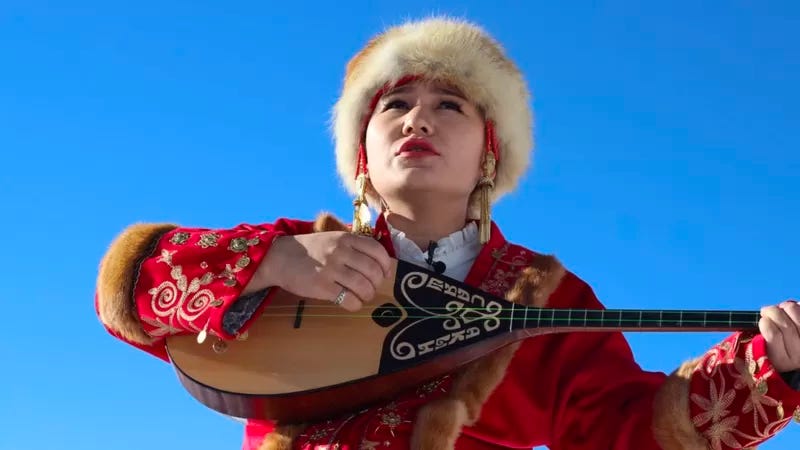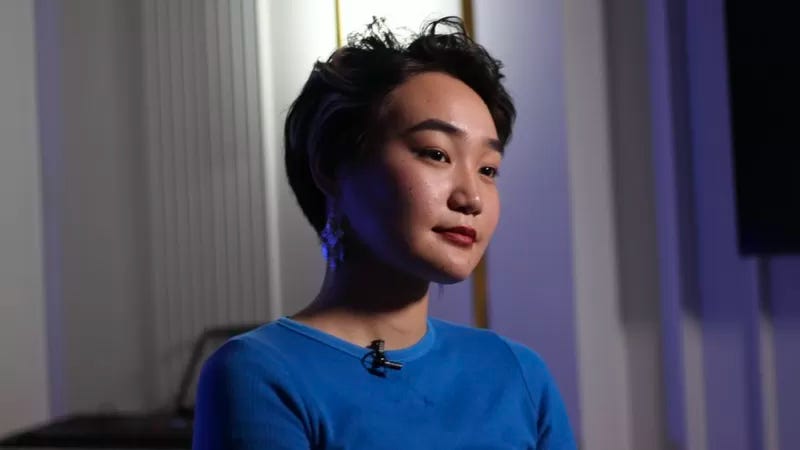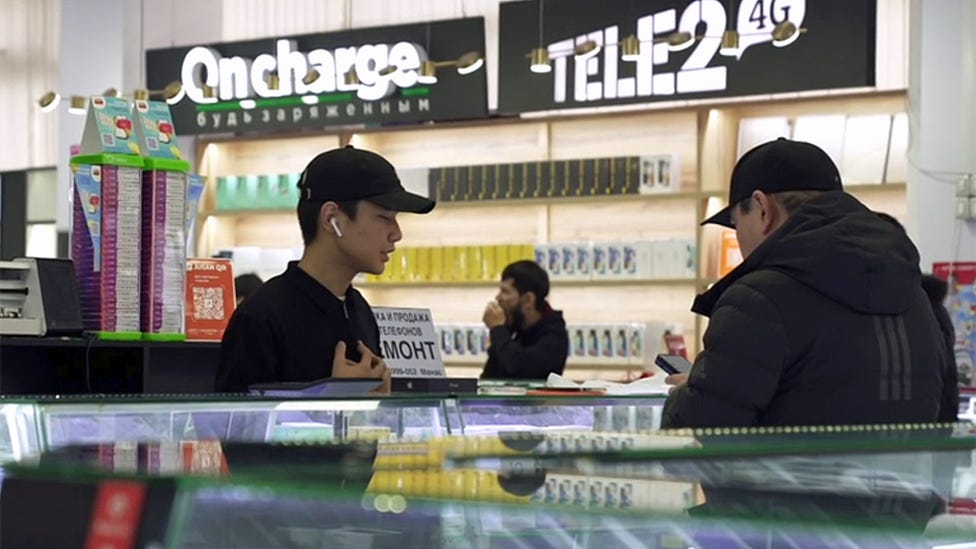“I am Kazakh”: How one Central Asian nation’s new generation is turning away from Russia
Since the start of Russia's war in Ukraine, there is growing talk of "decolonisation" in Kazakhstan, Central Asia’s largest country. But what does it mean?
By Nargiza Ryskulova, Almaty, Kazakhstan.

Since the start of the Ukraine War, many young people in Kazakhstan are increasingly turning to their roots. There is growing talk of “decolonisation" in Central Asia’s largest country, whose language and culture were suppressed or treated as inferior in the Russian Empire and later the Soviet Union.
It’s been said in Kazakhstan that by attacking Ukraine Vladimir Putin did more for popularising the Kazakh language than any Kazakh leader in the past 30 years. Many here are worried that the Kremlin's ambitions of restoring the Soviet Empire may not stop with Ukraine.
Concerns about Russia’s ambitions
“War crimes in Irpin and Bucha showed what the punishment can be for Ukrainians, simply for wanting to preserve their national identity, be proud of their history and speak their language,” says Ainash Mustoyapova, an academic and author of “Decolonising Kazakhstan”.
Some fear Russia may try to look for allies inside their country.
An incident in March this year sent shockwaves through Kazakhstan when a group of locals in a town close to the Kazakh-Russian border set up a “People’s Council” and voted to secede.
The mutiny was quickly quashed and the perpetrators arrested but social media in Kazakhstan was rife with discussions of how Moscow could take advantage of such situations.
Back in 2014 the Russian President Vladimir Putin said that historically Kazakhstan had never been an independent state. In 2020, several MPs from Russia’s ruling “United Russia” party spoke of how Kazakhstan was an artificially created state and how its northern territories were a “gift from Moscow” which could be claimed back.
Kazakhstan, like all the other former Soviet republics, became independent in 1991, when the USSR collapsed.
BBC is blocked in Russia. We’ve attached the story in Russian as a pdf file for readers there.
The country rich in oil and gas was led by President Nursultan Nazarbayev from 1991 to 2019. During this time Mr Nazarbayev and his immediate circle became the arbiters of all political and business decisions, while also establishing his personality cult, manifested, among many other things, in the country’s new capital being named after him.
While officially Kazahstan’s relations with Russia remain friendly, nostalgia for the Soviet Union is not widespread here, especially among the younger generation.
One hip and cool face representing the new generation is an artist and film director Suinbike Suleimenova. The 30-year-old's family history is a clear illustration of how the Kazakh national identity evolved in the past 80 years.
Return to the roots
In the 1930s Suinbike’s great grandfather was accused by the Soviet authorities of being a Kazakh nationalist and sent to a labour camp for the “traitors of the Motherland”. Her grandfather was born there. The family later returned to Kazakhstan.
Her grandfather and grandmother, prominent Kazakh artists, hardly spoke Kazakh language.

Suinbike is making her first full-length film - it’s a mockumentary entitled “Mambet”, a common man’s name among Turkic-language nations but also a derogatory term sometimes used to describe Kazakhs - equivalent of a “country bumpkin”.
Suinbike wants to explore why some people in her country speak Kazakh while others, even if they are ethnic Kazakhs, are ashamed of their language and prefer Russian: what drives these linguistic preferences, and what is the history behind them.
The film director explains how decades of Russification and gradual erasing of the Kazakh culture meant that a large proportion of ethnic Kazakhs can’t speak the language.
“Only in 2019, aged 26, I suddenly realised that I can speak Russian and English fluently but barely any Kazakh.” She now regrets having been “arrogant and ignorant” towards her own culture. She blames colonialism for this.
Kazakh is one of two state languages in Kazakhstan (Russian is the other) and is compulsory at secondary schools. In reality many people, living in cities, often didn’t learn it properly as Russian was a much better tool for career and social advancement.
Kazakhstan is a large country in terms of its territory, but its population is relatively small and it is one of the least densely populated countries in the world.
Out of the 19 mln population 70% (around 13.3 mln) are ethnic Kazakhs. Yet, around a half of those, six million, do not speak Kazakh.
Suinbike says in her film she wants to highlight a very real problem Kazakh society is faced with - that the ethnic Kazakhs inhabit two separate worlds, depending on whether they speak Russian or Kazakh.
“We were trained to think we were ugly”
Suinbike’s mother, Saule, an artist and painter, is not a confident Kazakh speaker either, even though her work has been focused on the theme of decolonisation.
“In 2012 I painted “I am Kazakh” - and was shamed for this work. In the Soviet Union we were always made to believe that being a nationalist was bad, even though a lot of the time it simply meant being proud of your culture, your identity and your language.”

One of Saule’s works is called “Three Brides”. It is a collage of a photograph of three Kazakh brides taken in 1875 by an unknown photographer and Saule’s painting and patchwork.
Saule says a friend of hers took a look at the photo and said: “They are so ugly!”
“This is how we’d been trained to see ourselves - as ugly. That’s why we were ashamed of ourselves. Decolonising our thinking means bringing ourselves into the world with dignity, not trying to pretend to be European.”
Channelling identity into poetry
29-year old Sayagul Birlesbek is also familiar with linguistic segregation but in a very different environment. She grew up in the Xinjiang province in the west of China. When she was 14, her family returned to Kazakhstan, their historic home. At school Sayagul struggled. Having grown up in China where she spoke Kazakh and Chinese, she discovered most of her school books were in Russian and her classmates spoke mostly Russian, a language she did not understand and could not speak.
She says she was anxious about falling behind in her studies and found it difficult to make friends. But she found refuge in music and poetry when she started to take part in traditional Kazakh spoken word contests, called Aitysh, where participants compete in playing string instruments and improvising poetry to the music. It is a traditional vocal art resembling rapping.

Sayagul took on a social media nickname and started making videos, playing her dombra and reciting poetry in Kazakh, sometimes about political issues, such as the environment, corruption and most recently - Russia’s aggression against Ukraine.
Many of her videos gather tens of thousands of views and the comment sections are filled with lively discussions of whether Kazakhstan needs to worry in the context of the Ukraine war. Concerns about the possibility of an attack or even plans by Russia and China to divide Kazakhstan up are common on social media.
“You don’t even look Kazakh”
20-year-old Mira Ungarova is embarrassed to admit that when she was at school, she took it as a compliment when someone said she didn’t come across as Kazakh. It meant she looked stylish and spoke Russian without an accent.
“When I was at school, I always dreamt of learning English and immigrating. I wasn’t interested in politics, but I knew about corruption and poor quality of the education system and health care. I simply did not see my future in Kazakhstan.”

In 2019 everything changed when the long-serving president Nursultan Nazarbayev suddenly left his post.
“It was very surprising for me and my friends. For the first time we were hopeful that things could change,” says Mira, who was 15 at the time.
In the following months which preceded the election of the new president, there were widespread protests in Kazakhstan against the chosen successor of President Nazarbayev, Kassym-Jomart Tokayev. The protests turned into violent clashes with police, during which 225 people died, according to the authorities. Real figure was probably much higher.
Kassym-Jomart Tokayev did become president but for Kazakhstan’s young generation there was no going back.
“It was very sad for me to see my compatriots being detained and thrown into police vehicles. This was when I became an activist,” says Mira.
The January that changed Kazakhstan: How the country is surviving the aftermath of the largest riots in its history
By Nargiza Ryskulova. The beginning of 2022 went down in modern Kazakh history as “Qandy Qantar” – bloody January. Discontent at rising gas prices quickly spiralled into multiple anti-government protests across the country; peaceful demonstrations spilled over into riots which were brutally s…
While becoming politically active, Mira also focused on improving her Kazakh and learning more about Kazakh history and culture.
She says at school she only needed to speak Russian and while she could speak Kazakh she was worried her accent was poor and didn't want to be mocked.
Author of “Decolonising Kazakhstan”, academic Ainash Mustoyapova explains that throughout the Soviet era higher education was switched almost exclusively to Russian.
This meant that anyone who wanted to go to university had to focus on doing well at secondary school in all subjects taught in Russian.
“This is how there are now several generations of Kazakhs who only speak Russian”, Mustoyapova says.
This began to change after the country became independent in 1991. With links to Moscow not completely cut but considerably weakened, more and more avenues opened for Kazakh language and culture to become popular. For instance, a growing number of foreign blockbusters are dubbed into Kazakh, and while Russian dubbing is still common, more and more people pick the Kazakh-language versions.
A recent poll showed that nearly 40% of young (18-29 yo) Kazakhs spoke the Kazakh language at home, while only 26% of Kazakhs aged over 61 years gave the same answer.
Uneasy friendship with Russia
Traditionally, Kazakhstan had been dependent on Russia for political and military support. As recently as January 2022, the current president Tokayev had to call in the Russian reinforcements to help quash a local uprising, a move that was controversial and unpopular even among those who were against the rebels.
Kazakhstan’s main sources of income are oil and gas. They are exported to external markets mostly via Russia. With sanctions against Russia kicking in as a result of the Ukraine War, Kazakhstan now has to look for alternative routes.
Kazakhstan is trying to hedge bets, while staying away from anti-Russian sanctions, introduced by many countries following the invasion of Ukraine but also speaking out in favour of Ukraine’s territorial integrity.
At the same time there are foreign imports reaching Russia via Kazakhstan, through a system labelled “double import”. Foreign goods are imported into Kazakhstan, a country not under Western sanctions, and then are re-exported to Russia, effectively avoiding sanctions.

President Tokayev was one of very few foreign leaders who paid President Putin a visit on May 9 this year, Russia’s main national holiday, Victory Day, celebrating the Soviet Union’s triumph in World War II. He looked uneasy and did not wear a St George yellow and black ribbon, which had become a symbol of “the Russian world”, with Russian-backed separatists sporting them in the east of Ukraine.
Many Russians sought refuge in Kazakhstan after the start of the Ukraine war and later when President Putin announced the military draft in September last year. There are various figures of how many Russians have fled their country for Kazakhstan but estimates are between one and up to three million people, though most are likely to have moved on to other countries.

Kazakhs had mixed feelings about the influx of the Russian citizens into their country. According to one poll, 27% of respondents backed it, while 38% were against.
At the same time Kazakhstan is increasing its spending on “patriotism” - cultural and educational programmes aimed at strengthening the Kazakhs' national identity are to receive five times more funds from the state budget than in previous years.
No turning back
Kazakhs are keen to learn more about their history and the Kazakh state which had existed in various shapes since the early Middle Ages. Many are discovering that as well as the state, their country’s art, literature and music reach back centuries and are something to be proud of.
For the new generation this is an irreversible trend, political analysts believe.
Young people constitute a majority in Kazakhstan - 93% of the population are under 65. A third are under the age of 15.
Political scientist Dimash Alzhanov says young people will undoubtedly become a driving force for change, both in terms of stronger Kazakh national identity but also in terms of democratic values.
“We now have a generation who expects an open society and respect for human rights. Tokayev [Kazakhstan’s 70-year old president] and other people in power are behaving in the style of the Soviet ruling elites, i.e., “we will tell you what to do.” Young people will not accept this and real changes are not far off.”
Read the full story in Russian here.
English version edited by Kateryna Khinkulova.
iPhone smugglers: the lucrative Russian trade in sanctions busting via Kazakhstan
By Anastasia Stogney and Anastasia Platonova. At the Zhibek Zholy (Silk Road) car market near Almaty, Kazakhstan’s biggest city, an imaginative film director could easily shoot a low-budget sequel to Mad Max. Along the line closest to the high…





